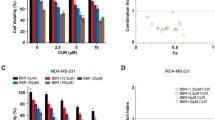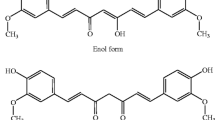Abstract
It has been suggested that combined effect of natural products may improve the treatment effectiveness in combating proliferation of cancer cells. Here, we examined the combined anticancer activities of compounds of three natural origin including baicalein, curcumin, and resveratrol with chemotherapy drug paclitaxel respectively, which showed that combination of paclitaxel with curcumin exhibited synergistic growth inhibition and induced significant apoptosis in MCF-7 cell lines. Treatment of MCF-7 cell lines with paclitaxel and curcumin induced the apoptosis of regulatory protein Bcl-2 but decreased Bax expression. In addition, simultaneous treatment with paclitaxel and curcumin strongly inhibited paclitaxel-induced activities of EGFR signaling. Furthermore, the combination of paclitaxel and curcumin exerted increased anti-tumor efficacy on mouse models. Overall, our data described the promising therapeutic potential and underlying mechanisms of combining paclitaxel with curcumin in treating breast cancer.







Similar content being viewed by others
References
Aggarwal, B.B. 1995. Activation of transcription factor NF-kappaB is Suppressed by curcumin (Diferuloylmethane). Journal of Biological Chemistry 270: 24995–25000.
Athar, M., J.H. Back, X. Tang, K.H. Kim, L. Kopelovich, D.R. Bickers, and A.L. Kim. 2007. Resveratrol: A review of preclinical studies for human cancer prevention. Toxicology and Applied Pharmacology 224: 274–283.
Banerjee, M., P. Singh, and D. Panda. 2010. Curcumin suppresses the dynamic instability of microtubules, activates the mitotic checkpoint and induces apoptosis in MCF-7 cells. FEBS Journal 277: 3437–3448.
Chao, J.I., W.C. Su, and H.F. Liu. 2007. Baicalein induces cancer cell death and proliferation retardation by the inhibition of CDC2 kinase and survivin associated with opposite role of p38 mitogen-activated protein kinase and AKT. Molecular Cancer Therapeutics 6: 3039–3048.
Chen, Q., S. Ganapathy, K.P. Singh, S. Shankar, and R.K. Srivastava. 2010. Resveratrol induces growth arrest and apoptosis through activation of FOXO transcription factors in prostate cancer cells. PLoS ONE 5: e15288.
Chou, T.C., and P. Talalay. 1984. Quantitative analysis of dose-effect relationships: The combined effects of multiple drugs or enzyme inhibitors. Advances in Enzyme Regulation 22: 27–55.
Clark, C.A., M.D. Mceachern, S.H. Shah, Y. Rong, X. Rong, C.L. Smelley, G.C. Caldito, F.W. Abreo, and C.O. Nathan. 2010. Curcumin inhibits carcinogen and nicotine-induced mammalian target of rapamycin pathway activation in head and neck squamous cell carcinoma. Cancer Prevention Research 3: 1586–1595.
Cotter, T.G. 2009. Apoptosis and cancer: The genesis of a research field. Nature Reviews Cancer 9: 501–507.
Dhillon, N., B.B. Aggarwal, R.A. Newman, R.A. Wolff, A.B. Kunnumakkara, J.L. Abbruzzese, C.S. Ng, V. Badmaev, and R. Kurzrock. 2008. Phase II trial of curcumin in patients with advanced pancreatic cancer. Clinical Cancer Research 14: 4491–4499.
Frbmont, L. 2000. Biological effects of resveratrol. Life Sciences 66: 663–673.
Gupta, S.C., J.H. Kim, S. Prasad, and B.B. Aggarwal. 2010. Regulation of survival, proliferation, invasion, angiogenesis, and metastasis of tumor cells through modulation of inflammatory pathways by nutraceuticals. Cancer and Metastasis Reviews 29: 405–434.
Huang, W.S., Y.H. Kuo, C.C. Chin, J.Y. Wang, H.R. Yu, J.M. Sheen, S.Y. Tung, C.H. Shen, T.C. Chen, M.L. Sung, H.F. Liang, and H.C. Kuo. 2012. Proteomic analysis of the effects of baicalein on colorectal cancer cells. Proteomics 12: 810–819.
Johnson, J.J., and H. Mukhtar. 2007. Curcumin for chemoprevention of colon cancer. Cancer Letters 255: 170–181.
Li-Weber, M. 2009. New therapeutic aspects of flavones: The anticancer properties of Scutellaria and its main active constituents wogonin, baicalein and baicalin. Cancer Treatment Reviews 35: 57–68.
Maier-Lenz, H., B. Hauns, B. Haering, J. Koetting, K. Mross, C. Unger, T. Bauknecht, A. du Bois, H.G. Meerpohl, N. Hollaender, and K. Diergarten. 1997. Phase I study of paclitaxel administered as a 1-hour infusion: Toxicity and pharmacokinetics. Seminars in Oncology 24(Suppl. 19): 16–19.
Miocinovic, R., N.P. McCabe, R.W. Keck, J. Jankun, J.A. Hampton, and S.H. Selman. 2005. In vivo and in vitro effect of baicalein on human prostate cancer cells. International Journal of Oncology 26: 241–246.
Nagaraju, G.P., S. Aliya, S.F. Zafar, R. Basha, R. Diaz, and B.F. El-Rayes. 2012. The impact of curcumin on breast cancer. Integrative Biology (Cambridge) 4: 996–1007.
Newman, D.J., G.M. Cragg, and K.M. Snader. 2003. Natural products as sources of new drugs over the period 1981–2002. Journal of Natural Products 66: 1022–1037.
Nicoletti, M.I., V. Lucchini, G. Massazza, B.J. Abbott, M. D’Incalci, and R. Giavazzi. 1993. Antitumor activity of taxol (NSC-125973) in human ovarian carcinomas growing in the peritoneal cavity of nude mice. Annals of Oncology 4: 151–155.
Perez, E.A. 1998. Paclitaxel in breast cancer. Oncologist 3: 373–389.
Saydmohammed, M., D. Joseph, and V. Syed. 2010. Curcumin suppresses constitutive activation of STAT-3 by up-regulating protein inhibitor of activated STAT-3 (PIAS-3) in ovarian and endometrial cancer cells. Journal of Cellular Biochemistry 110: 447–456.
Sharma, R.A., S.A. Euden, S.L. Platton, D.N. Cooke, A. Shafayat, H.R. Hewitt, T.H. Marczylo, B. Morgan, D. Hemingway, S.M. Plummer, M. Pirmohamed, A.J. Gescher, and W.P. Steward. 2004. Phase I clinical trial of oral curcumin: Biomarkers of systemic activity and compliance. Clinical Cancer Research 10: 6847–6854.
Shehzad, A., F. Wahid, and Y.S. Lee. 2010. Curcumin in cancer chemoprevention: Molecular targets, pharmacokinetics, bioavailability, and clinical trials. Archiv der Pharmazie 343: 489–499.
Simon, H.U., A. Haj-Yehia, and F. Levi-Schaffer. 2000. Role of reactive oxygen species (ROS). Apoptosis 5: 415–418.
Sparano, J.A., M. Wang, S. Martino, V. Jones, E.A. Perez, T. Saphner, A.C. Wolff, G.W. Sledge, W.C. Wood, and N.E. Davidson. 2008. Weekly paclitaxel in the adjuvant treatment of breast cancer. New England Journal of Medicine 358: 1663–1671.
Sun, X.D., X.E. Liu, and D.S. Huang. 2012. Curcumin induces apoptosis of triple-negative breast cancer cells by inhibition of EGFR expression. Molecular Medicine Reports 6: 1267–1270.
Takahashi, H., M.C. Chen, H. Pham, E. Angst, J.C. King, J. Park, E.Y. Brovman, H. Ishiguro, D.M. Harris, H.A. Reber, O.J. Hines, A.S. Gukovskaya, V.L. Go, and G. Eibl. 2011. Baicalein, a component of Scutellaria baicalensis, induces apoptosis by Mcl-1 down-regulation in human pancreatic cancer cells. Biochimica et Biophysica Acta 1813: 1465–1474.
Wang, L., Y. Ling, Y. Chen, C.L. Li, F. Feng, Q.D. You, N. Lu, and Q.L. Guo. 2010. Flavonoid baicalein suppresses adhesion, migration and invasion of MDA-MB-231 human breast cancer cells. Cancer Letters 297: 42–48.
Wu, B., J. Li, D. Huang, W. Wang, Y. Chen, Y. Liao, X. Tang, H. Xie, and F. Tang. 2011. Baicalein mediates inhibition of migration. BMC Cancer 11: 527.
Acknowledgments
This work was supported by National Natural Science Foundation of China (Grant Nos. 81302800 and 81102414), the National Science Foundation for Post-doctoral Scientists of China (Grant No. 2013M532062).
Conflict of interest
None declared.
Author information
Authors and Affiliations
Corresponding author
Rights and permissions
About this article
Cite this article
Zhan, Y., Chen, Y., Liu, R. et al. Potentiation of paclitaxel activity by curcumin in human breast cancer cell by modulating apoptosis and inhibiting EGFR signaling. Arch. Pharm. Res. 37, 1086–1095 (2014). https://doi.org/10.1007/s12272-013-0311-3
Received:
Accepted:
Published:
Issue Date:
DOI: https://doi.org/10.1007/s12272-013-0311-3




